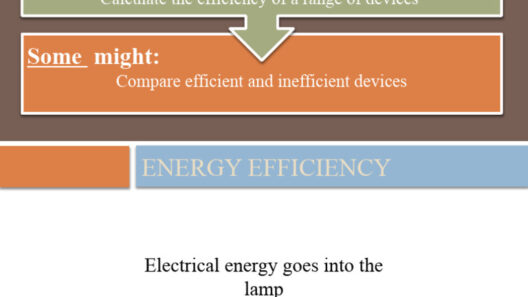Energy conservation is an essential aspect of environmental stewardship and economic prudence. The intricate relationship between energy use, environmental sustainability, and economic viability necessitates a profound understanding of why conserving energy is not merely a choice but a collective imperative. This discourse delves into the multifaceted advantages of energy conservation, elucidating its potential to engender significant environmental and economic benefits.
Transitioning perspectives on energy consumption can lead to substantial changes in our collective future. A shift in mindset from the traditional notion of unlimited energy accessibility to a more sustainable approach opens avenues for innovation, efficiency, and resilience.
The Environmental Imperative: Protecting Our Planet
Energy conservation plays a pivotal role in mitigating the adverse effects of climate change. Traditional energy sources, particularly fossil fuels, are major contributors to greenhouse gas emissions. The combustion of these resources releases carbon dioxide and other pollutants into the atmosphere, exacerbating global warming and harmful air quality. By reducing our energy consumption, we can curtail these emissions at a fundamental level, marking a significant stride towards environmental remediation.
Additionally, conserving energy helps in preserving biodiversity and natural ecosystems. The extraction and processing of fossil fuels can lead to habitat destruction and loss of species. By investing in energy conservation strategies, such as energy-efficient appliances and renewable energy sources, we reduce the demand for such environmentally invasive practices, allowing ecosystems to thrive undisturbed.
Water conservation is another critical aspect closely tied to energy consumption. Traditional energy production processes, including coal and natural gas, require vast quantities of water for cooling and maintenance. Lessening energy dependence directly impacts water use, alleviating pressure on this vital resource. Sustainable water management practices are a natural extension of energy conservation endeavors, promoting a holistic approach to environmental protection.
The Economic Benefits: Securing a Sustainable Future
Beyond environmental considerations, energy conservation bears significant economic benefits. The reduction of energy consumption leads to lower utility bills for households and businesses alike. By adopting energy-efficient practices, such as utilizing LED lighting and high-efficiency appliances, users can witness noticeable reductions in their energy expenditures. Such savings can be redirected towards other essential services or investments, fostering economic stability and growth.
Moreover, energy conservation reduces the strain on power grids. During peak demand periods, energy consumption can exceed supply, leading to increased prices and potential outages. By promoting energy-saving initiatives, such as implementing demand response programs and encouraging off-peak usage, communities can maintain more stable energy prices and enhance the reliability of their electricity supply.
Investment in energy-efficient technologies stimulates economic growth and job creation. The energy sector is evolving, with a burgeoning demand for skilled workers specializing in renewables, energy efficiency, and smart grid technologies. By prioritizing energy conservation, nations can create a workforce equipped with the competencies needed in a rapidly changing energy landscape, fostering both economic resilience and innovation.
Creating a Cycle of Benefits: The Interconnection of Conservation and Innovation
Energy conservation instigates a cycle of innovative solutions that further enhance efficiency and sustainability. As the demand for energy-efficient technologies grows, research and development in alternative energy systems gain momentum. This innovation leads to advancements in solar, wind, and geothermal energy, which provide cleaner, more sustainable power options.
Community-level initiatives also play a critical role in fostering a culture of energy conservation. Small, local projects, such as community solar installations or neighborhood energy efficiency competitions, engage residents and businesses in collective efforts to reduce energy use. The social benefits of such initiatives enhance community bonds and foster an environment of collaborative innovation.
Behavioral Change: The Role of Awareness and Education
Raising awareness about the importance of energy conservation is imperative for effecting behavioral change. Educational programs focusing on the impacts of energy use on the environment and the economy cultivate a consciousness that prioritizes sustainability. Such initiatives can be implemented in schools, workplaces, and public outreach campaigns to create a culture that values and practices energy conservation.
Behavioral nudges, such as providing real-time energy consumption data or creating incentives for energy-saving actions, can enhance engagement. Individuals are more likely to commit to energy conservation when they see the immediate impact of their efforts, facilitating a more profound commitment to sustainable practices.
Conclusion: The Call for Action
The need for energy conservation transcends mere choice; it is a necessity for safeguarding our planet and securing our economic future. The environmental benefits, including the reduction of greenhouse gas emissions and the preservation of natural ecosystems, coupled with economic gains from lower energy costs and job creation, present a compelling case for adopting energy-saving practices. As we collectively transition towards a more sustainable future, it is vital to foster awareness and inspire individuals and communities to engage in energy conservation efforts actively.
Ultimately, a concerted focus on energy conservation promises not only to alleviate environmental degradation and economic challenges but also to cultivate a culture of sustainability and resilience for generations to come. The transformation begins with a shift in perspective, recognizing that every effort, no matter how small, contributes to a larger and vital purpose.








